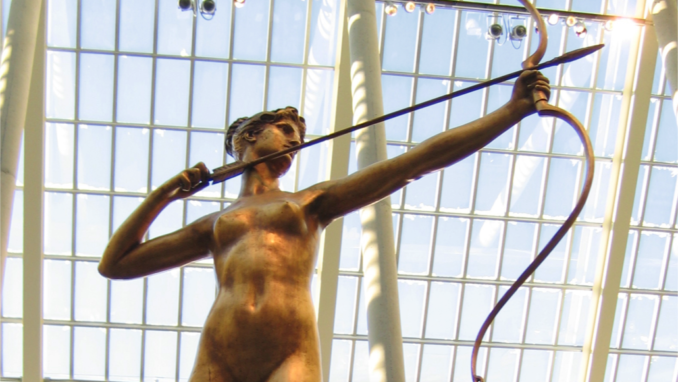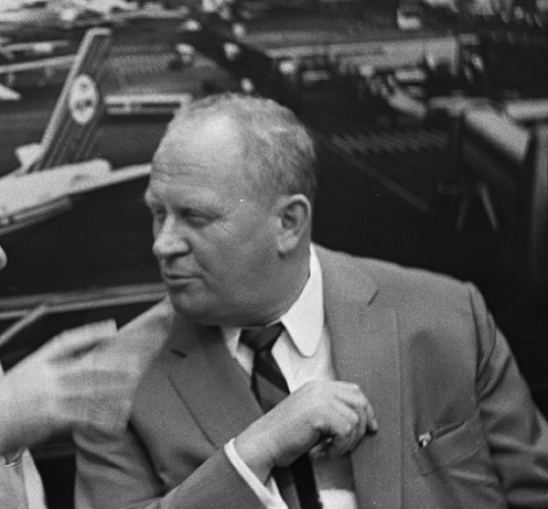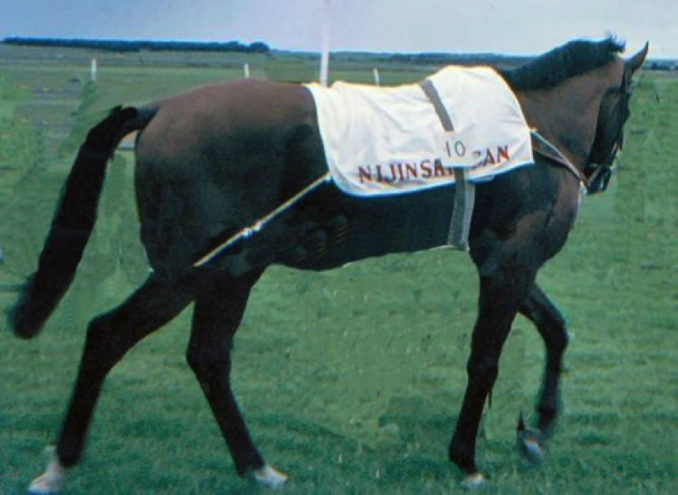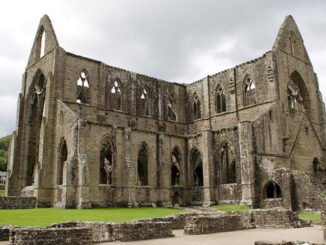Whilst doing some research for a future article in the ‘Going for Gold’ series I came across an interesting story which I thought would make for a separate article in its own right.
Charles W. Engelhard, Junior, was a philanthropist and metals magnate. Born in New Jersey on 15th February 1917, he was the only son of Charles Engelhard a Prussian who emigrated from Hanau in 1891 as the sales representative of a platinum firm.

Diana by Augustus Saint-Gaudens,
postdlf – Licence CC BY-SA 3.0
Charles Senior invested in precious metals companies becoming very wealthy. Speaking about his father Charles Junior said,
“My father was very thorough, very Germanic. He controlled every detail of the business, visited every plant he owned every day, punching in and out by the time clock. In some companies he signed every check more than 50 cents. I can’t ever remember having a personal conversation with him. All we ever talked about was business. We talked out his problems. So even in my youth I had an intimate knowledge of business and my Father’s whole ambition was to have me succeed him in the business, something I was extremely keen to do”.
Charles Junior was educated in Johannesburg, continuing in England where he attended Charterhouse School and graduated at Christ Church, Oxford University in 1931. He later graduated at Princetown University with a degree in history in 1939.
During WWII he joined the Army Air Corps in 1941 and was honourably released after earning the rank of Captain having served as a bomber-pilot.
He married Jane Reiss in 1947, a tall and striking woman. The couple purchased and completely renovated a 172-acre equestrian estate in New Jersey, making it a perfect home for their five daughters.
In the grounds of the estate, a pet lion cub named Charlie was free to roam, even accompanying them on fishing trips to Canada each June. He was shipped in a crate along with some of their golden retrievers. Charles was quoted as saying “I don’t know what the customs man would have thought if he opened the lid”. Eventually, the lion cub was donated to Toronto Zoo.
In his continuing quest for his own success, he travelled extensively to South Africa during the 1940s and 50s. There he established a business partnership with Harry Oppenheimer and his firm DeBeers. He also served as chairman of the American – South African Investment Company Limited, of Johannesburg, the management entity of his 15% ownership of all South African mine interests.
Government regulations in South Africa prohibited the export of gold bullion without the proper permits granted through the central bank, which were extremely difficult to obtain. Ever the resourceful industrialist, Engelhard exploited a loophole in regulations which permitted the export of art objects. He formed a new company that purchased gold directly from his own business and had it cast into statues, jewellery, pulpit pots and other religious objects. These “objets d’art” were then exported to Hong Kong where they were melted at Engelhard’s refinery and returned to gold bullion, allowing them to be used for industrial purposes or sold on the open market.
During his time in South Africa, Engelhard met Ian Fleming, author of the James Bond novels. It is suggested that Fleming became so enthralled with Engelhard’s global industrialist lifestyle that it inspired his 1959 James Bond character, Goldfinger. Like Engelhard, Auric Goldfinger was a major racehorse-owner and clandestinely transported gold about the world to avoid export restrictions.
Following release of the film in 1964, Engelhard began calling a stewardess on his personal jet “Pussy Galore” and he showed up for a party in an orange Goldfinger sweatshirt.

Premiere van de film Knotsgekke kerels in hun vliegende kratten,
Eric Koch – Licence CC BY-SA 1.0
Engelhard had two family homes in South Africa; a 25-acre estate “Courthouse” and a large country home overlooking the forestry town of Sabie. He also owned twelve other homes on four continents, including the New York Waldorf Towers, a summer home at Dark Harbour in Maine and a flat at the Grosvenor Hotel in London. He also had a home in Paris, an apartment in Rome, a fishing lodge in Quebec and a floor of the Dolder Grand Hotel in Zurich.
His business interests stretched over fifty countries, requiring him to travel extensively. Business associate and friend Alfred Vanderbilt described him as
“a mogul. My wife and I have gone to Africa and Asia with the Engelhards and you go first class. Every place we went we met the important people – lunch with Indira Gandhi, the embassy people. You see things worth seeing in a country; you don’t sit around all day and have drinks. You learn what a place is like and what its problems are.”
Upon the death of his father in 1950, Engelhard inherited the family business, as well as the title of “Platinum King” from his father, a moniker he reportedly detested. He greatly expanded the family-held enterprise, adding new product lines to serve the automotive, petroleum, chemical, electronics, aerospace, aviation, glass and synthetic fibres industries. In 1958, he consolidated his various operating companies into Engelhard Industries, Inc. and brought the company public on the New York Stock Exchange.
Engelhard was a major contributor to the US Democratic Party and in the 1960 presidential election organised the National Committee of Business and Professional Men and Women for Kennedy and Johnson. In 1955 he ran for New Jersey State Senate against incumbent Malcolm S Forbes, in what was called the “Battle of the Billionaires”. He lost by 370 votes. He reportedly felt it a blessing in disguise as it allowed him the freedom to continue constructing his vast economic and industrial empire.
Engelhard’s greatest personal enjoyment came from thoroughbred horse racing. The high-risk and exciting nature of this sport attracted him and in 1957 his passion quickly grew into a world-beating empire. He owned over 300 horses, the most notable being the 1970 English Triple Crown winner, Nijinsky.

NijinskyII,
Paddy Briggs – Public Domain
Engelhard gave much of his wealth and time to supporting good causes such as the Boys Town Organisation in the US, dedicated to caring for children and families.
Shortly before his death in 1971, Engelhard disposed of most of his South African businesses, selling them to Anglo-American companies.
On the 2nd March 1971, at the age of 54, Charles Engelhard died in his sleep at his island home in Boca Grande, Florida. 900 mourners attended his funeral in New Jersey, dignitaries included former President and Mrs Johnson and Senator Ted Kennedy.
He certainly led a full and fruitful life.
The Goodnight Vienna Audio file



